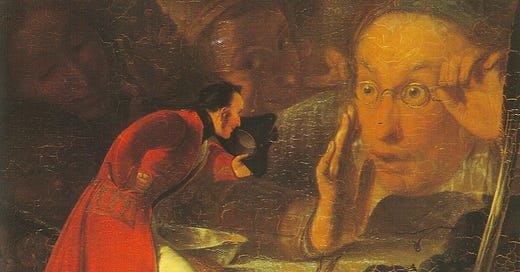After Gulliver makes his way to court in Brobdingnag, he faces a whole new series of challenges and humiliations, is treated as a pet, and is categorized as one of a species of "odious little vermin." Let's take a brief look at these moments before discussing his absurdly traumatic return to England at the end of Part 2 in our next installment.
Chapters 3 through 5
Gulliver's farmer-master, having exploited him for profit to the extent that he assumes that the little creature is wasting away, brings him to court in order to get a good price for him before he dies. In this transition from the farm to the court, we see different attitudes toward the "animal" that is Gulliver that reflect the respective social stations. The farmer sees the animal as a creature to make use of, to exploit for profit, while the Queen and her maids in waiting view him as a pet—as a form of amusement and a creature to be coddled.
This role positions him as a rival to another human source of a amusement at court—the Queen's dwarf, "being of the lowest stature that was ever in that country (for I verily think he was not full thirty foot high)." The parenthetical remark reminds us how Gulliver is quick to adopt the perspective of the society in which he finds himself. To see a thirty-foot "dwarf" as small is, of course, ludicrous for Gulliver, but just as we saw him expecting great things in England from his Lilliputian sheep, he now sees the world with Brobdingnagian eyes, at least for the moment.
His relatively diminutive size also turns him into a pet at court, as the maids of honor frequently undress in front of him with no feeling of modesty, much as one might undress before one's dog or cat. In addition to being a pet, he also becomes a kind of sex toy:
The handsomest among these maids of honor, a pleasant, frolicsome girl of sixteen, would sometimes set me astride upon one of her nipples; with many other tricks, wherein the reader will excuse me for not being over particular.
The question of what sort of "tricks" a "frolicsome" girl might perform with a six-inch man I shall leave to your imaginations. Don’t be filthy.
Throughout these chapters we see Gulliver alternating between moments of outsized (Lilliputian?) pride in tiny accomplishments (killing a rat, sailing a toy boat) and episodes in which he is humiliated or placed in situations of grave danger, or both at the same time (the dwarf's shenanigans, his abduction by a pet monkey)—most of which the court finds hilarious.
Chapters 6 and 7
During Gulliver's first voyage, the Lilliputians, who were, after all, a thinly veiled representation of various aspects of English society, are the objects of Swift’s satirical blade for all of their outrageous and inhumane behavior, despite their diminutive size. In Brobdingnag, however, the lens is inverted: the Brobdingnagians, though certainly not perfect, seem reasonable by comparison to the Europe that Gulliver describes to the king in these chapters. His Majesty deconstructs each aspect of court culture, education, economics, and politics that Gulliver relates and comes to a crushing conclusion:
I am well disposed to hope you may hitherto have escaped many vices of your country. But, by what I have gathered from your own relation, and the answers I have with much pains wringed and extorted from you; I cannot but conclude that the bulk of your natives, to be the most pernicious race of odious little vermin that nature ever suffered to crawl upon the surface of the earth.
The phrase “pernicious race of odious little vermin” certainly resonates differently in the 21st century than it would have in the 18th, as we in the United States currently have a presidential candidate who has used the word “vermin” to refer to various categories of human beings, in apparent imitation of an instigator of genocide whom he reportedly admires.
Consider, however, the extent to which Swift proves himself once again to be a writer for our times: as we move through Brobdingnag and eventually to the land of the Houyhnhnms, we become more cognizant of the temptations of misanthropy and self-isolation. This is clear not only from Gulliver’s own growing misanthropic tendencies, but also, more subtly, through the problematic racial classifications of the apparently more rational Brobdingnagians and Houyhnhnms (as we shall see when we come to them in Gulliver’s fourth voyage). The failure on the part of the people of Brobdingnag to see Gulliver as human, as opposed to a pet or livestock, is failure of empathy that many of us manifest when we confront the Other.
This is a failure that I hope enough of us can overcome between now and November 5th to avoid a further national descent into misanthropy.
Thanks for your patience, readers, as I catch up with our survey of Gulliver’s Travels. In case you missed it, I explained the reasons for the slowdown in this post. I’m finding my parenting sea legs, however, and I will be catching up over the next couple of weeks—both with Swift and with my series on the music of 1980.
Thanks for reading, from my fancy internet typewriter to yours.






Another grand in-depth look at a novel I have loved since --oh forever?!!! xoxo